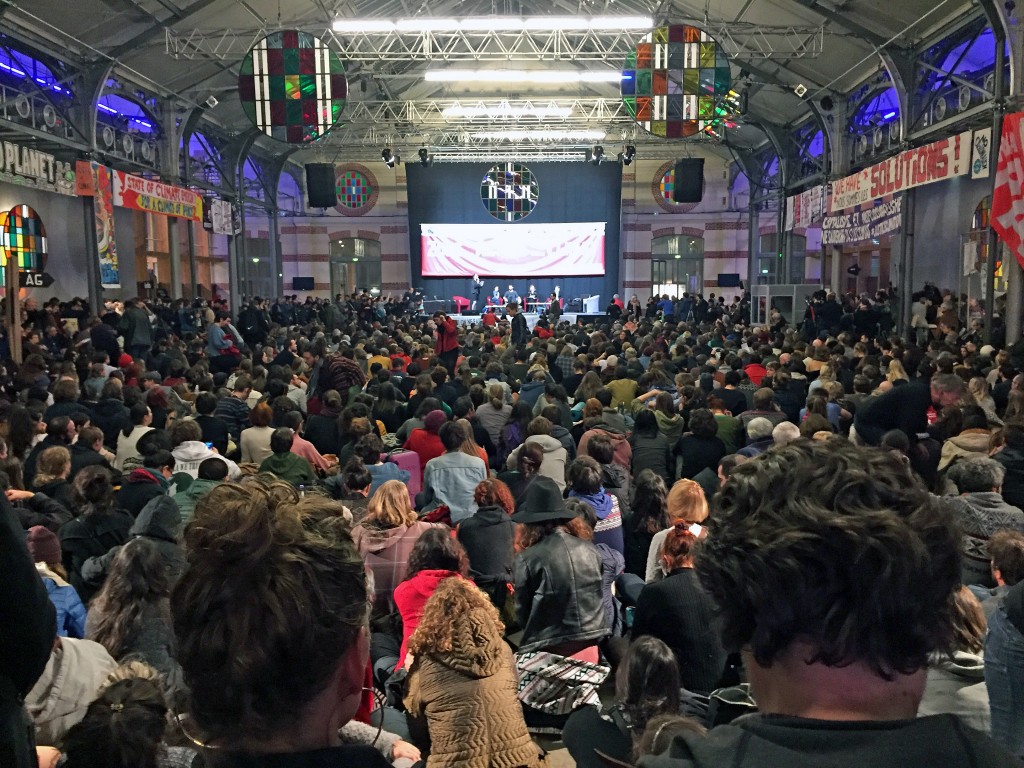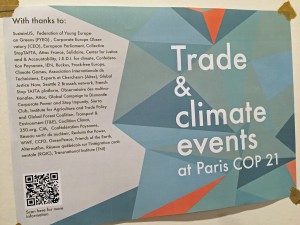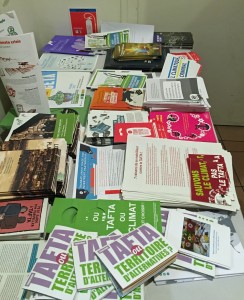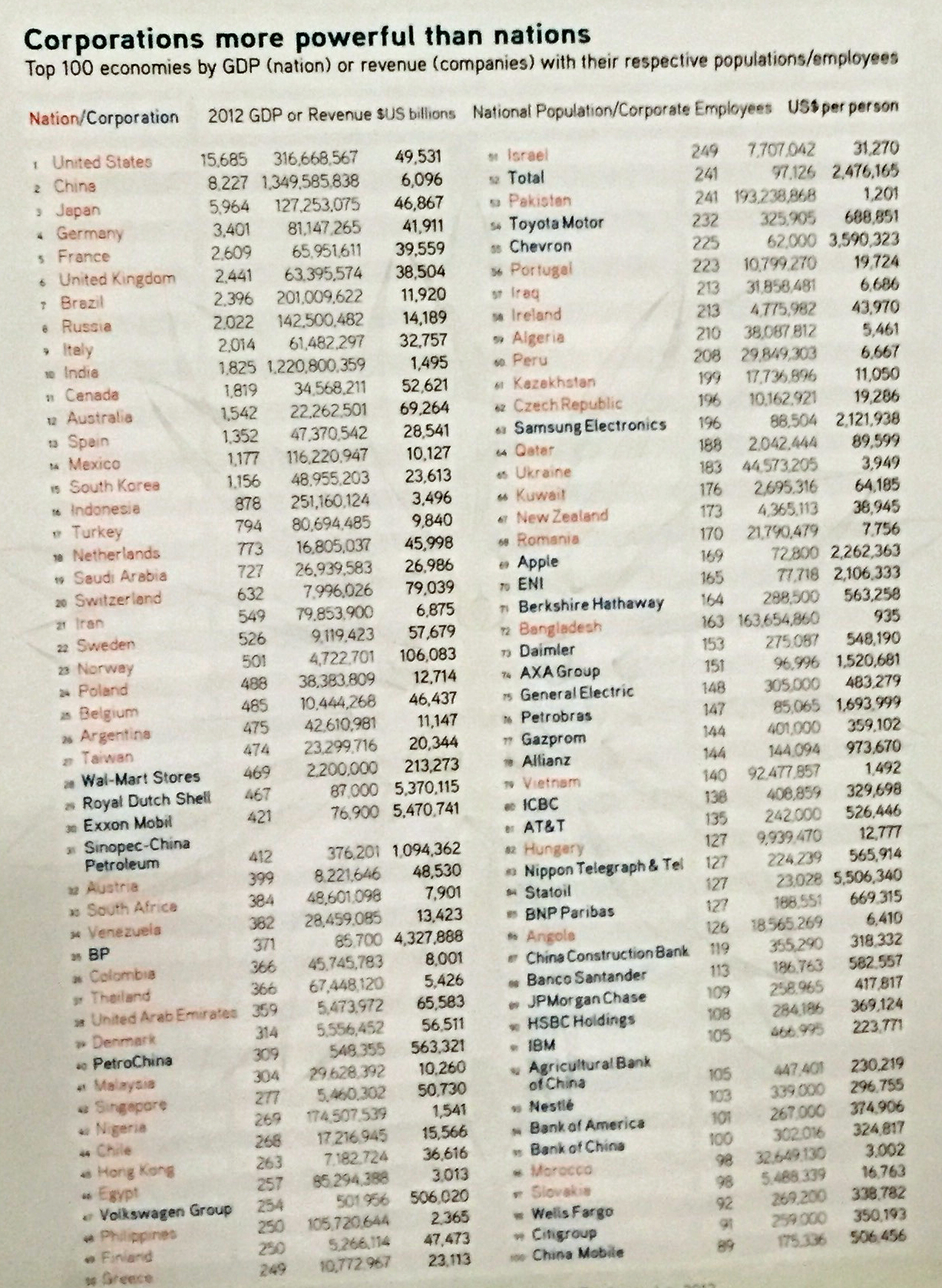Today started with an email from the U.S. State Department warning me that the French government is likely to crack down on climate demonstrations planned for Saturday. As it happened, my plane flight home was scheduled for 10:30 a.m. Saturday, so I can’t take part in this anyway. Knowing that UN climate negotiations have a history of going over by a day, I asked Place to B before my trip if I could stay until Sunday. But they said they had another event starting Saturday and would not have room, and I didn’t want to try to find a place to stay in Paris for just one night.
 So I scheduled my flight to return home Saturday, and now I am just as glad. I nearly got swept up at Place de la Republique my first day here, and do not want to try my luck again. It sounds as if there will be mass arrests not only at Place de la Republique but also Le Bourget. Although I respect each person’s decision about practicing civil disobedience, and under the right circumstances I might decide to do so myself, I am not interested in getting arrested in France.
So I scheduled my flight to return home Saturday, and now I am just as glad. I nearly got swept up at Place de la Republique my first day here, and do not want to try my luck again. It sounds as if there will be mass arrests not only at Place de la Republique but also Le Bourget. Although I respect each person’s decision about practicing civil disobedience, and under the right circumstances I might decide to do so myself, I am not interested in getting arrested in France.
I spent the day in a low-key way trying to catch up on news from the Blue Zone and touch base with my friends back home though social media. The truth is, I have been here 12 days and am ready to go home — but negotiations over the agreement are entering a crucial phase, and I want to see this through. Yesterday at 3 p.m. the UNFCCC released its latest version of the draft text — to the pleasure of no one. Many important areas of disagreement still have not been hammered out — for example, there are still three options regarding temperature target, and some of them still have brackets. Activists staged a huge sit-in near the replica of the Eiffel Tower in the Blue Zone while negotiators stayed up most of the night working on the text, with another draft due today. I’m thankful that Amy Goodman with Democracy Now is inside reporting on events.
I also got news from back home of a Senate hearing organized by Ted Cruz this week on “Data or Dogma? Promoting Open Inquiry in the Debate over the Magnitude of Human Impact on Earth’s Climate” — featuring testimony from a right-wing radio host and three of the only scientists in the world who disagree with the 97 percent consensus that climate change is real and caused by humans chiefly through burning of fossil fuels. Cruz’s stance on climate change is to claim that his denial is based on science, even though pretty much every scientific academy in the United States and across the rest of the world disagrees.
 However, Greenpeace had a surprise going into this hearing. Earlier it conducted an investigation in which its agents posed as representatives of a Middle Eastern oil company and offered one of the witnesses, William Happer, professor emeritus of physics at Princeton, $250 an hour in exchange for a research paper touting the benefits of carbon dioxide. The parties even discussed how to route the money through a nonprofit called Donors Trust, known for its support of climate denial, so that Happer could state he was not paid for the research. Happer bragged that he had been paid $8,000 by Peabody Coal in exchange for testimony at regulatory hearings in Minnesota, and that he had donated the funds to CO2 Coalition, run by a man with ties to the George C. Marshall Institute, Competitive Enterprise Institute, and American Petroleum Institute.
However, Greenpeace had a surprise going into this hearing. Earlier it conducted an investigation in which its agents posed as representatives of a Middle Eastern oil company and offered one of the witnesses, William Happer, professor emeritus of physics at Princeton, $250 an hour in exchange for a research paper touting the benefits of carbon dioxide. The parties even discussed how to route the money through a nonprofit called Donors Trust, known for its support of climate denial, so that Happer could state he was not paid for the research. Happer bragged that he had been paid $8,000 by Peabody Coal in exchange for testimony at regulatory hearings in Minnesota, and that he had donated the funds to CO2 Coalition, run by a man with ties to the George C. Marshall Institute, Competitive Enterprise Institute, and American Petroleum Institute.
Just before the hearing, Greenpeace confronted Happer personally, and it was this footage I saw today. While I wish such investigations were not necessary, unfortunately right now they are. Scholars such as Robert Brulle and Riley Dunlap have documented the vast network of dark money front groups that fund climate change denial — groups that are completely legal under our current system because they don’t have to disclose their donors, but which are used to mislead the public based on a model pioneered by the tobacco industry. The subject has gotten comprehensive treatment in Merchants of Doubt by Naomi Oreskes and Erik Conway, now available as a documentary.
Oreskes and Conway argue that climate denial is not about science but about politics, and is rooted in free-market fundamentalism that has transferred the old Cold War mentality of fighting Communism to fighting environmentalism. Despite the emphasis on money, Oreskes and Conway think that the few scientists involved with climate denial front groups are motivated not by money but by ideology. This makes sense in Happer’s case, as he was donating any money he got to a climate denial front group.
Today in Paris I decided to visit the Climate Action Zone, or ZAC, held in the Centquartre, an arts complex located near the basin where the indigenous flotilla took place. It is yet another multi-day conference held in conjunction with the negotiations at COP21. ZAC started on Monday, but today is the first day I was able to get there. Each day ends with a general assembly, and tonight’s assembly featuring Naomi Klein was on “Capitalism Against Climate: How Free Trade Agreements Undermine Climate Actions.” This time I heard about the event in advance because the Sierra Club is a co-sponsor through its campaign on trade and climate, and we were asked to tweet from the event.
The Centquartre, or “104” turned out to be an enormous open building — which was good because 3,000 people were already there to see Klein when I arrived 15 minutes early. I had wanted to get there earlier, but had a hard time finding a place to eat in the area. There were few restaurants, and the one I found through Yelp turned out to be closed – but fortunately another one was open across the street where I got a delicious potato-cheese casserole with a side salad for about 12 euros. Up and down each side of the main auditorium were large climate banners and posters, and I managed to find a place to stand on some steps in the back where I could see proceedings.
Naomi Klein kicked off the event with a 20-minute talk on trade and climate. Calling the rise of awareness about climate change coupled with the rise in multinational trade agreements an “epic case of bad timing,” Klein gave examples of cases in which trade agreements allowed corporations to sue governments to stop projects that would be good for climate – a solar plant in Quebec and community ownership of power plants in Germany. She argued that the Kyoto accord contained express provisions stating that trade agreements trump climate agreements, and that while the United States was insisting the Paris agreement not be legally binding, fossil fuel corporations were heavily involved in insisting that trade agreements such as the TPP be as binding as possible. My Citizens Voice colleague Jeremy Lent was there and recorded her talk.
Also speaking was German climate activist Tadzio Mueller; Ilana Solomon of the Sierra Club Responsible Trade program, and Joseph Purugganan, a climate activist from the Philippines. Mueller discussed how the trade and climate movements don’t talk to each other but should. Here is video of his talk from Jeremy Lent of Citizens Voice:
The event made me think a lot more about the crossover between trade agreements and climate. I disagree with Klein’s implication that the Paris Agreement needed to be binding, because that would require it go before the U.S. Senate, which as we know would never approve it. The world cannot afford for the United States to pull out of this agreement as it did from Kyoto. On the other hand, I did not know about the rules allowing trade to trump climate, and believe we will need to take action to ensure trade does not multiply greenhouse-gas emissions or that corporations can sue to dismantle climate programs and regulations to guard their own interests.
After the trade and climate event, I walked to Generator Hostel to catch the discussion after their showing of Groundswell Rising. I got there as a doctor with Physicians for Social Responsibility was discussing the health aspects of fracking. This is what ultimately got Gov. Cuomo to ban fracking in New York, and has not been seriously considered by states like Ohio where fracking is rampant. Several British fracking activists were present, including Maria from Scotland, and they made plans to have a tour of the movie there. I also met a former fracking worker named Ray from Dimmock, Penn., the epicenter of fracking problems in the United States. He was featured in Josh Fox’s Gasland and knows every anti-fracking celebrity in the book. Discussion went so long that there was not a second showing of the film, so I hope to catch it another time.








